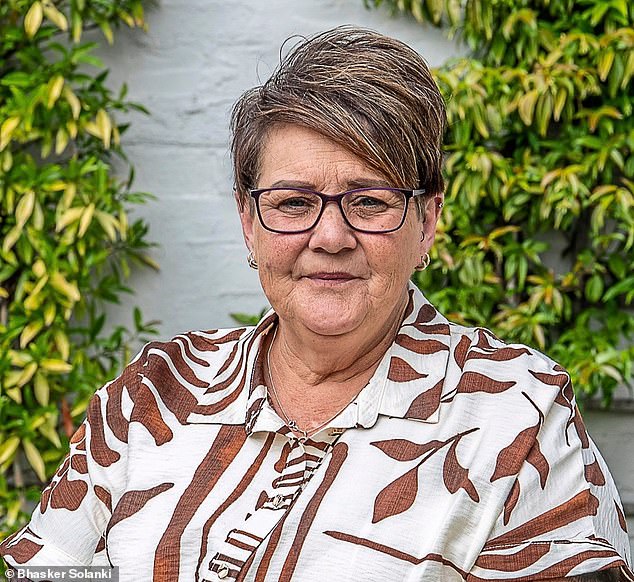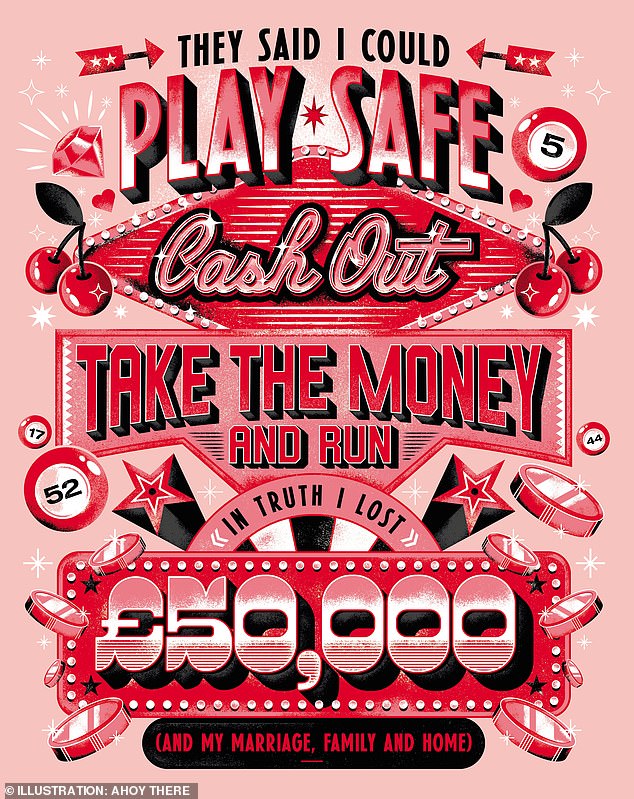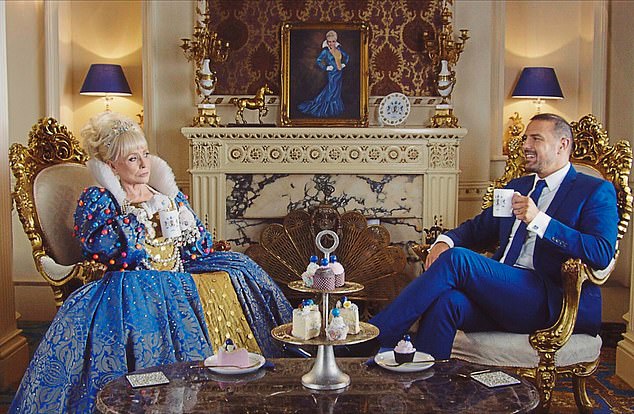When Tracy Page’s gambling addiction became too much to bear, she decided to take her own life. Relations with her children were broken, her marriage was over, her beautiful home was gone; expensive cars and Caribbean holidays were a thing of the past and her debts were mounting. There was nowhere further to fall.
‘I was exhausted – that’s the only way I can describe it,’ she says. ‘And not just physically; I was mentally exhausted. I just felt I couldn’t take any more. I’d been going to the doctor in the run-up and had built up a lot of medication because I knew what I was going to do. I took a serious overdose.’
Fortunately, Page, now 52, survived, but her ordeal was not over. In the years that followed, her gambling habit would grow worse – fuelled, she says, by a barrage of TV and social-media marketing aimed at women, which she found dangerously appealing.
‘I began to notice it about six or seven years ago, and it made gambling seem normal – even fun,’ she says. ‘The ads were bright and colourful. During the evening, it seemed every other ad was for online bingo and slots. They would come on during soaps, peak time programmes and before the watershed, and there would be friendly faces like Heather Graham and Paddy McGuinness telling you how much fun you could have.
‘They were there during the day, too, after Loose Women or This Morning. They’re obviously aimed at mums at home with children looking for a bit of escapism.
‘The women in the ads were pretty and looked happy, and the message seemed to be that gambling was harmless and sociable. There were never-ending offers on my phone: free spins on online casino slot machines, extra credit – messages saying, “Put this amount of money on, and we’ll give you a 100 per cent bonus if you win”.’

Tracy Page was ‘bombarded’ with online gambling ads
Ultimately, Page didn’t win. She went bankrupt in 2017 and then again at the end of 2024. ‘I’d racked up £50,000 in debts.’
This former medical company executive from Droitwich, Worcestershire, is one of a growing number of women identified as problem gamblers in the UK. According to the Gambling Commission, which oversees the industry, now 37 per cent of all problem gamblers are women. And, worryingly, research has found that the rate of addiction among women is growing.
Campaigners and gambling-addiction charities argue that this is due to the massive growth in advertising and online casinos deliberately targeting women. A 2023 survey into female gambling habits by GambleAware found that as many as 2.4 million women have experienced harm either due to their own gambling or because of someone else’s.
It warned: ‘While gambling addicts are disproportionately male, the number of women seeking treatment has doubled in the past five years, up from 1,134 in 2015-16 to 2,423 in 2020-21.’ While these numbers may appear relatively small, they represent the tip of a very large iceberg as only a tiny fraction of gambling addicts ask for treatment.
‘The increase in online casinos and gendered marketing has definitely led to a rise in female gambling,’ says Rosalind Baker-Frampton, clinical director at gambling-addiction charity Gordon Moody, named after the concerned clergyman who founded it.
‘Historically, gambling was seen as a male pastime because betting shops were a very male place. Women didn’t want to go into them. The perception was that gamblers were a certain type: white men in their 40s or 50s who enjoyed hanging around betting shops.
‘They tended to place bets on horse racing or other sports where there was an element of judgment and skill. But with the game-ification of gambling and online casinos, where gambling simply involves luck with slot machines or bingo numbers at home, more women have become attracted to it.’
Quick to notice the possibilities, the gambling industry created games aimed at women on their online casinos, then casinos just for women. With names such as Pink Casino, Ladies Nite and Queenplay (all perfectly legal), they often present images of happy, laughing women, cash falling like confetti, while websites feature glitterballs, fluffy imagery and a profusion of the colour pink.
Page was one of the women who felt that this legitimised her gambling habit, rendering it a bit of harmless fun. She had dabbled since before the advent of online casinos, but their arrival made it far easier to play games – and far quicker to lose money on them.


Heather Graham was the face of foxy bingo
‘I used to go to the bingo with my sister,’ she says. ‘Back then, it was a social night out. But then online bingo came along – my favourites were Jackpotjoy and Foxy Bingo – which gave you access to bingo and gambling all the time.’
When asked to comment, Jackpotjoy, on which Page gambled the most, did not respond. Foxy Bingo replied, ‘Player safety is our top priority. We are committed to promoting responsible play to all our customers through clear messaging, robust safer gambling tools and ongoing support. We offer features such as deposit limits, reality checks and self-exclusion options. Our marketing efforts are designed to be socially responsible and comply with all relevant marketing regulations.’
Page continues: ‘I had been through a number of failed relationships and divorce – I was using online gambling as a coping mechanism. It helped block all that out. All I’d ever wanted was a [secure and happy] marriage like my grandparents and mum and dad, but that didn’t happen for me. That made me feel like a failure. I’d use gambling so I didn’t have to think about that, or anything else.
‘I might have had a difficult few days, or be feeling a bit low, then I’d see all these adverts for gambling and they made it look like fun. You get bombarded with them, and suddenly, all your senses engage and you think, “Oh well, this will cheer me up for a while.” It’s an escape from real life. You don’t have to go anywhere or socialise with other people. It’s something that you can do alone and in secret.’
Page started betting on online slot machine games, just 10p per spin to begin with – and several times she won as much as £600. ‘Once that happened, I was drawn in and increasing my bets to 20p, 50p, £2, trying for the next big win,’ she says. ‘It got to the point where I was making excuses not to go out with friends or engage with anyone except my work colleagues.
‘I was isolating and gambling more and more, usually on my laptop and in the evening. There were times I spent over 30 hours on the trot playing games. I would gamble my wages away as soon as I got them. It could be £10 or as much as £1,000 in one night.
‘After I’d lose, I’d lie to my parents about having extra bills so they would lend me money. Then I got bank loans, payday loans and I maxed out my credit cards. I was in a lot of debt. It took just six months for me to become completely addicted and in a lot of trouble.’
According to the GambleAware report, Page is by no means alone. ‘For the women in our research, such marketing strategies did not emerge as a driver to begin gambling but were prompting women to continue, to gamble more often, or diversify to try new gambling products,’ it says.
The Betting and Gaming Council, which represents the regulated betting and gambling industry, says 22.5 million people a month enjoy gambling and the overwhelming majority do so without negative repercussions. It adds: ‘All gambling marketing is subject to strict rules set by the Advertising Standards Authority and the Gambling Commission and further reinforced by the Industry Code for Socially Responsible Advertising. These rules include clear bans on appealing to children or vulnerable groups, using misleading claims or portraying gambling as a solution to financial or personal difficulties.’

Barbara Windsor and Paddy McGuinness in an ad for Jackpotjoy
Page’s story has a happy ending. Last year, after an intervention by her three grown-up daughters, she was admitted to a free six-week residential course at a clinic run by the Gordon Moody charity in Wolverhampton, West Midlands – the first women-only treatment centre of its kind in the UK, possibly the world.
‘My daughters might have had an inkling I was gambling too much in 2021, but they wouldn’t have realised how bad it was,’ she says. ‘When we finally started talking about it, I felt a massive relief.’
Page underwent a ‘tech detox’ with no access to her phone, along with personal, group and art therapy.
‘You get downtime to reflect on things and gradually over the six weeks you break the mask you have been wearing and let the wall you have built around you fall down,’ she says. ‘It’s eye-opening to discover who you are without gambling, and you learn so much about yourself and why it took over.
‘I’ve been free of gambling since October 2024, I’m almost debt-free, and much more optimistic about my future. My relationship with my girls had been almost nonexistent but now it’s wonderful. We speak every day on the phone or on FaceTime.
‘I have two grandsons aged three and five who I idolise, but because of my financial situation I’d never been able to buy them the presents I wanted to, and I felt bad about that. I was often not there, and even when I was, I’d be gambling on my phone. But now I realise that quality time together is the most valuable gift we can give. I won’t let anything in the world jeopardise that.’
Page now believes her positive role in life is to warn that gambling isn’t fun. ‘If there’s anyone out there who sees themselves in my story then, please, get help,’ she says, ‘before things spiral out of control.’
For more information, visit gambleaware.org or gordonmoody.org.uk
Statistics from Gordon Moody, Gambling Commission, HMRC












